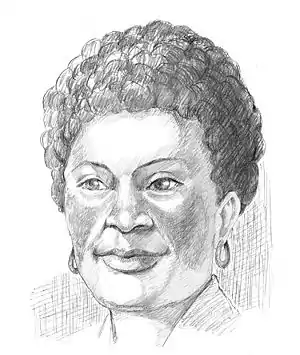Malar rash
A malar rash (from Latin mala ‘jaw, cheek-bone’), also called butterfly rash,[1] is a medical sign consisting of a characteristic form of facial rash. It is often seen in lupus erythematosus. More rarely, it is also seen in other diseases, such as pellagra, dermatomyositis, and Bloom syndrome.
| Malar rash | |
|---|---|
 | |
| A malar rash, or "butterfly rash," is characteristically red or purplish and mildly scaly (seen in patients with systemic lupus erythematosus). |
A malar rash of lupus is red or purplish and mildly scaly. It has the shape of a butterfly, and involves the bridge of the nose. Notably, the rash spares the nasolabial folds of the face, which contributes to its characteristic appearance. It is usually macular with sharp edges, and not itchy.
There are may conditions which can cause rashes with a similar appearance to a malar rash. A malar rash is present in approximately 46–65% of people with lupus.
Definition
A malar rash of lupus is red or purplish and mildly scaly. It has the characteristic shape of a butterfly, and involves the bridge of the nose. Notably, the rash spares the nasolabial folds of the face, which contributes to its characteristic appearance. It is usually macular with sharp edges, and not itchy. The rash can be transient or progressive with involvement of other parts of the facial skin.
While some literature has described the slapped-cheek rash of fifth disease as a malar rash, it differs slightly in that the nose is typically spared.[2]
Differential diagnosis
There are many conditions which can cause rashes with a similar appearance to a malar rash.[1] These include:
Lupus causes up to 96% of all cases of malar rash.[3] Where lupus is suspected, further medical tests and a detailed history and examination are necessary to differentiate it from other conditions. These tests may include an ANA as a screening test, which is not specific for lupus erythematosus.
Epidemiology
A malar rash is present in approximately 46–65% of people with lupus,[7][8] with an average of 57% of lupus patients having it across all populations.[3] This percentage varies between different populations.[7][8]
History
A malar rash is often known more colloquially as a butterfly rash due to its distinctive appearance.[1]
See also
References
- Nouh A, Speiser J, Biller J (2015-01-01). "Chapter 3 - Acquired neurocutaneous disorders". In Islam MP, Roach ES (eds.). Handbook of Clinical Neurology. Neurocutaneous Syndromes. 132. Elsevier. pp. 29–73. doi:10.1016/b978-0-444-62702-5.00003-2. ISBN 9780444627025. PMID 26564070.
- Cooray M, Manolakos JJ, Wright DS, Haider S, Patel A (October 2013). "Parvovirus infection mimicking systemic lupus erythematosus". CMAJ. 185 (15): 1342–4. doi:10.1503/cmaj.121565. PMC 3796600. PMID 23979870.
- Uva L, Miguel D, Pinheiro C, Freitas JP, Marques Gomes M, Filipe P (October 2012). "Cutaneous manifestations of systemic lupus erythematosus". Autoimmune Diseases. 2012: 834291. doi:10.1155/2012/834291. PMC 3410306. PMID 22888407.
- Dreizen S (January 1991). "The butterfly rash and the malar flush. What diseases do these signs reflect?". Postgraduate Medicine. 89 (1): 225–8, 233–4. doi:10.1080/00325481.1991.11700800. PMID 1824645.
- Sontheimer RD (May 2004). "The management of dermatomyositis: current treatment options". Expert Opinion on Pharmacotherapy. 5 (5): 1083–99. doi:10.1517/14656566.5.5.1083. PMID 15155110. S2CID 9829484.
- Aljarad S, Alhamid A, Rahmeh AR, Alibraheem A, Wafa A, Alachkar W, et al. (December 2018). "Bloom syndrome with myelodysplastic syndrome that was converted into acute myeloid leukaemia, with new ophthalmologic manifestations: the first report from Syria". Oxford Medical Case Reports. 2018 (12): omy096. doi:10.1093/omcr/omy096. PMC 6217711. PMID 30410776.
- Houman MH, Smiti-Khanfir M, Ben Ghorbell I, Miled M (2004). "Systemic lupus erythematosus in Tunisia: demographic and clinical analysis of 100 patients". Lupus. 13 (3): 204–11. doi:10.1191/0961203303lu530xx. PMID 15119551. S2CID 30569636.
- Vilá LM, Alarcón GS, McGwin G, Friedman AW, Baethge BA, Bastian HM, et al. (March 2004). "Early clinical manifestations, disease activity and damage of systemic lupus erythematosus among two distinct US Hispanic subpopulations". Rheumatology. 43 (3): 358–63. doi:10.1093/rheumatology/keh048. PMID 14623949.
External links
- "Malar ("butterfly") rash, patient with SLE, gross". The Internet Pathology Laboratory for Medical Education. The University of Utah Eccles Health Sciences Library.
- MedlinePlus Encyclopedia: Systemic lupus erythematosus
